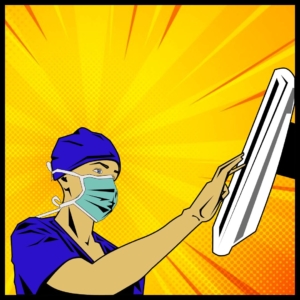Healthcare Career Pathways
Did you know that the healthcare industry is booming? It’s true! According to the Bureau of Labor Statistics (BLS), “Employment of healthcare occupations is projected to grow 14 percent from 2018 to 2028, much faster than the average for all occupations, adding about 1.9 million new jobs.” This above-average growth is expected all across the healthcare industry – from doctors to nurses to home health aides to phlebotomists.
No matter whether you are just starting your super career journey, transitioning into a new position, or looking to advance your healthcare hero skills, there are ample opportunities in the healthcare field for education and career growth.
Career Paths for Healthcare Champions
 When people think of healthcare careers, they tend to think of doctors and nurses. But the healthcare industry is compromised of many different heroes working to treat or provide diagnostic, preventive, remedial, and therapeutic care. In addition to frontline workers, healthcare includes occupations such as physicians, EMTs, paramedics, physical therapists, medical transcriptionists, pharmacists, and more.
When people think of healthcare careers, they tend to think of doctors and nurses. But the healthcare industry is compromised of many different heroes working to treat or provide diagnostic, preventive, remedial, and therapeutic care. In addition to frontline workers, healthcare includes occupations such as physicians, EMTs, paramedics, physical therapists, medical transcriptionists, pharmacists, and more.
Some people begin their healthcare career right out of high school (or even while still in high school), whereas others spend many years pursuing higher education. Additionally, some people begin working in a healthcare position and earn more certifications or degrees, allowing them to advance to more lucrative positions. For example, some individuals become an RN (registered nurse) upon earning their bachelor’s degree. At some point in their career, they may decide to earn their master’s degree. With a master’s degree, they can land a higher paying job as a nurse practitioner.
Heros in training: Different Types of Education
When people think of healthcare education, they tend to think of spending years attending medical schools. While doctors and surgeons will invest many years earning their professional titles, there are many other healthcare educational pathways for those interested in the industry, beginning with graduating from high school and receiving certification.
Those with only a high school diploma or GED have an opportunity to work in the exciting healthcare industry upon completing a certified training program. Here are some of the healthcare careers which only require a postsecondary certified training:
- EMTs and Paramedics
- Home Health Aides and Personal Care Aides
- Licensed Vocational Nurses Medical Assistants
- Medical Records and Health Information Technicians
- Medical Transcriptionists
- Nursing Assistants
- Pharmacy Technicians
- Phlebotomists
- Surgical Technologists
Some healthcare careers require employees to have a diploma or an associate’s degree, and most require specialized certification in that specific field. Here are some of the healthcare careers which require an associate’s degree:
- Diagnostic Medical Sonographers
- Nuclear Medicine Technologists
- Occupational Therapy Assistants
- Physical Therapist Assistants
- Radiation Therapists
- Radiologic and MRI Technologists
- Respiratory Therapists
Other healthcare careers require employees to hold a bachelor’s degree in a certain field. Additionally, many of these careers require the individual to be licensed in the state where they practice. Here are some of the healthcare careers which require a bachelor’s degree:
- Athletic Trainers
- Clinical Laboratory Technologists and Technicians
- Dietitians and Nutritionists
- Exercise Physiologists
- Recreational Therapists
- Registered Nurses
Many individuals enter the healthcare field in one of the previously mentioned careers and then pursue higher education. Those who earn a master’s degree earn a higher salary and hold higher positions. Here are a few examples of careers for those with a master’s degree:
- Genetic Counselors
- Healthcare Administration and Management
- Nurse Anesthetists, Nurse Midwives, and Nurse Practitioners
- Occupational Therapists
- Physician Assistants
The highest level of education you can earn is a doctoral degree. To become a physician or surgeon, individuals need to earn a bachelor’s degree, a degree from medical school, and complete a 3-7 year internship or residency program.
The Fantastic Future of Healthcare

Unlike other industries, the healthcare industry is here to stay. We will always need healthcare workers, and statistics suggest we are going to need even more. As the baby boom generation ages and there are higher rates of chronic diseases, more doctors will be sought for preventative care.
To help doctors see all their patients, they will rely on medical assistants to perform routine administrative and clinical duties. While physicians need a doctoral degree, medical assistants only need postsecondary education or certification to enter this career field. Similarly, pharmacy technicians are in demand because they are also taking on greater roles in pharmacy operations.
Moreover, technology is changing the healthcare industry, opening up even more opportunities. For example, BLS claims, “Employment of medical records and health information technicians is projected to grow 11 percent from 2018 to 2028.” As more personal healthcare information is stored using electronic systems, there will be a greater need for people who know how to use technology for medical records and health information.
Some people think that technology will put people out of a job, but this is not the case when it comes to healthcare. As digital healthcare technologies become the norm, such as 3-D printing and robotics, we will need individuals who both know how to operate these technologies and are skilled at collecting and analyzing newfound data.
You even get paid to be a Hero!
Healthcare is a recession-proof industry. As Top Resume explains, “People and animals get sick regardless of the economy, so they always need access to qualified professionals who can help.” No matter what is happening with the economy, healthcare workers will always be in demand.
Not only will healthcare careers always be in demand, but they also guarantee a steady paycheck. While how much you earn will ultimately depend on your education and career choice, you can expect to make a livable wage. For example, with an associate’s degree or certification, phlebotomists earned median pay of $35,510 in 2019. Median earnings increase with further education, with physicians and surgeons at the top, earning more than $208,000 per year.
Finally, working in healthcare allows individuals to give back to society. As you help others with their health needs, you will feel a greater sense of purpose. Few industries offer as many fulfilling career pathways as healthcare.

